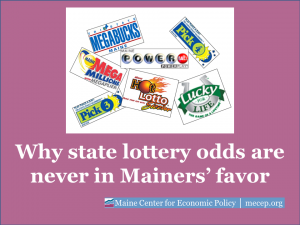It’s hard to imagine a tax that people would line up to pay; a tax so enticing it would be the topic of conversation week after week. But that’s exactly what the Maine State Lottery is; and what’s more, it’s an inefficient tax that disproportionately affects the poor.
For 40 years, the lottery has effectively taken money from Maine’s poorest and placed it into the state’s General Fund. “Hope for the Hopeless”, a 2015 Cornell University study for the Maine Center for the Public Interest, concluded that those living in Maine’s poorest communities spent more on lottery tickets than those in the most affluent.
 Now, Maine lawmakers are finally taking notice. The legislature’s Government Oversight Committee recently voted to fast-track a study into the practices of the lottery (an independent government agency). Disturbingly, lawmakers appear to have focused on the wrong aspects of the program—namely, whether the lottery deliberately targets the poor, and whether recipients of food stamps or cash assistance are spending public money to buy lottery tickets. The Maine State Lottery doesn’t need to single out low-income Mainers with its $3.1 million advertising budget—the studies of 38 other state lotteries back up the correlation between poverty and lottery ticket purchases .
Now, Maine lawmakers are finally taking notice. The legislature’s Government Oversight Committee recently voted to fast-track a study into the practices of the lottery (an independent government agency). Disturbingly, lawmakers appear to have focused on the wrong aspects of the program—namely, whether the lottery deliberately targets the poor, and whether recipients of food stamps or cash assistance are spending public money to buy lottery tickets. The Maine State Lottery doesn’t need to single out low-income Mainers with its $3.1 million advertising budget—the studies of 38 other state lotteries back up the correlation between poverty and lottery ticket purchases .
The Lottery touts its $54 million contribution to the state’s general fund, plus a small portion to the Outdoor Heritage Fund (less than $19 million in 19 years). Additional money goes to small businesses through vendor fees and commissions. But it is clear that the lottery is a terribly ineffective vehicle for economic stimulus. Not only is it highly regressive, but the lottery spends millions of state dollars on advertising (through a Massachusetts-based agency) and personnel expenses each year. The lottery also fails to bring in significant revenue from out-of-state, but simply moves the money around our state’s economy like a shell game, with advertising agencies and other middlemen taking their cut.
The legislature could replace the funds the lottery contributes to the state budget with an alternative form of revenue –an increase in the cigarette tax or alcohol taxes would plug the hole in state coffers while discouraging, rather than encouraging sale of harmful substances. What’s more, they would eliminate a regressive form of taxation, and one which incurs an overhead of more than $4 million the in operations and advertising. When voters approved the lottery in a 1974 referendum, part of the rationale was that Maine was losing out—New Hampshire established its own state lottery a decade earlier. But now, in the era of online gambling, that reasoning seems archaic. We can’t stop people wasting their money on gambling, but Maine can end its state-sanctioned vehicle for doing so. Rather than selling the hope of a “silver bullet”, lawmakers should put state money to better use solving the root causes of poverty in Maine.



